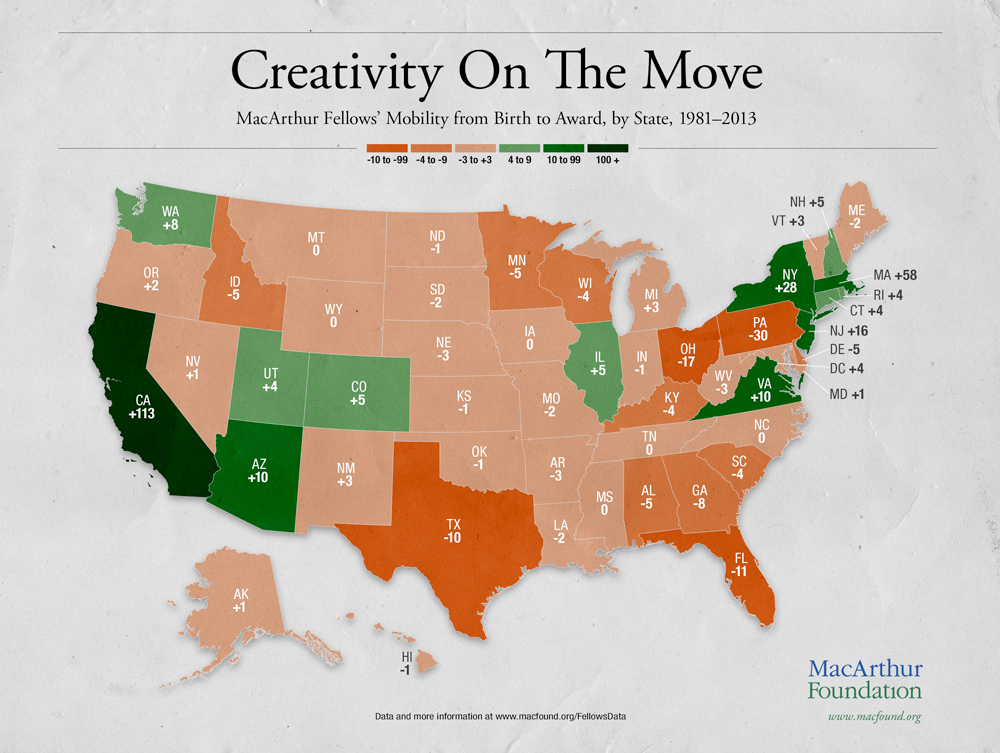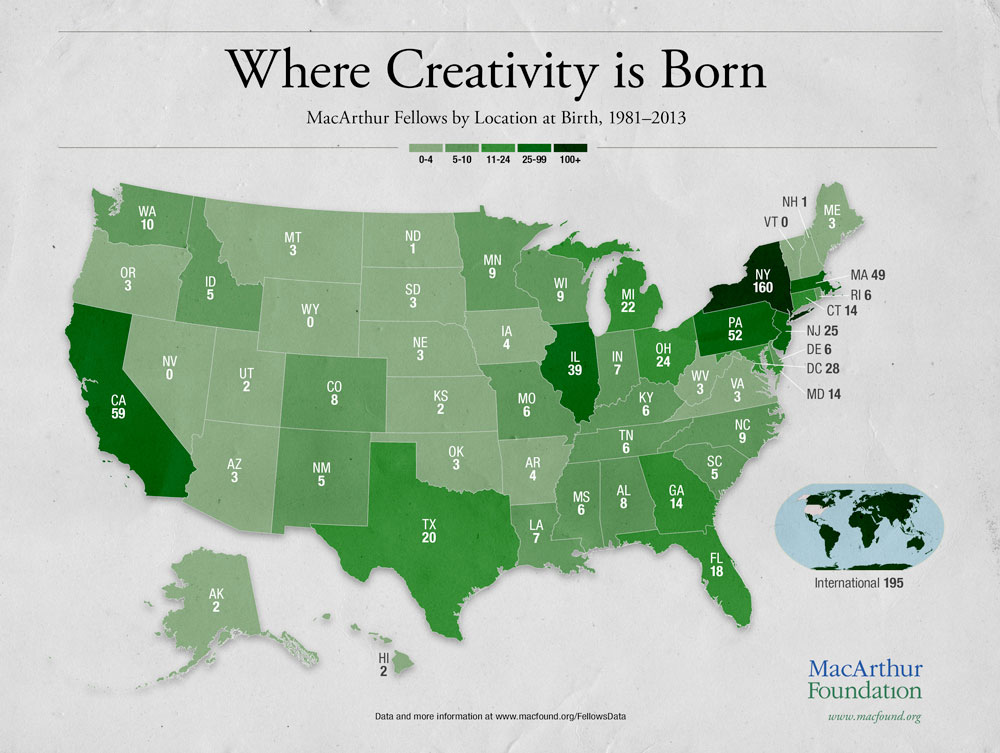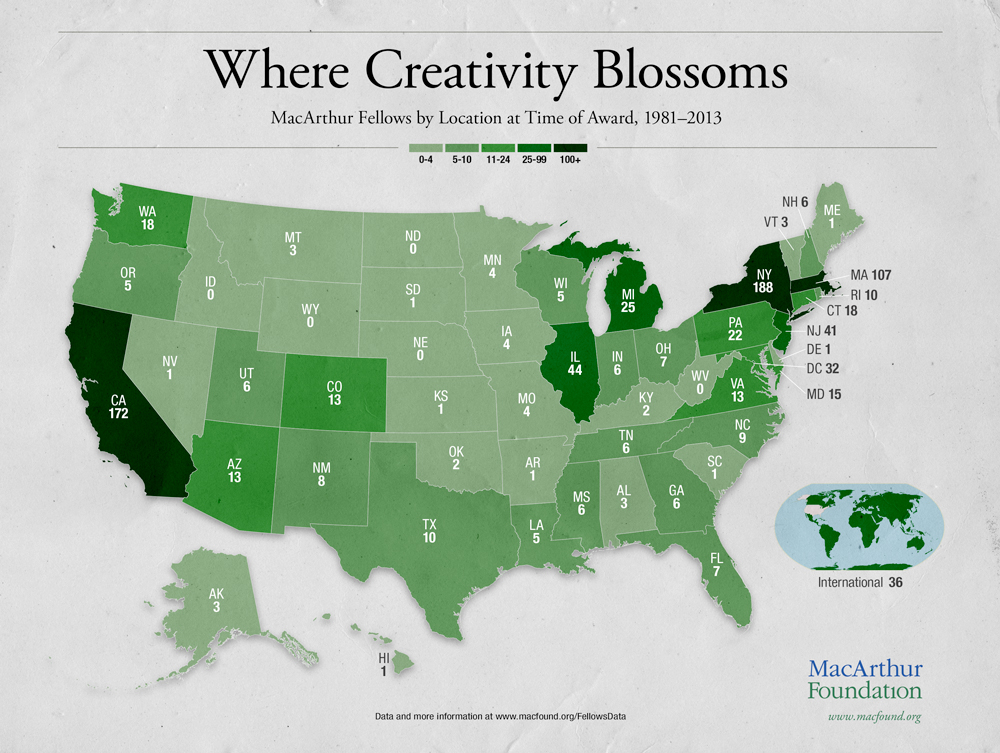I was not sure where playwright Tarell McCraney would be when I called to tell him that he had won a MacArthur Fellowship and an accompanying stipend of $625,000 with no strings attached. McCraney grew up in Miami, went to college in Chicago, and had no permanent address last September when I was to share the news with him. McCraney is one of the 897 exceptionally creative individuals who have been recognized by the MacArthur Foundation since 1981 and, among our Fellows, his story is not unique. MacArthur Fellows turn out to be a highly mobile population, prompting us to ask, “Do highly creative people move more than others, or does moving make people more creative?”
We recently compared data on the geographic distribution of MacArthur Fellows at the time of the award to their distribution by place of birth. This is the first time that these data have been compiled and made available publicly. MacArthur Fellows are a distinctive demographic, people identified as “creative,” “talented,” “innovative,” and “intelligent” in a survey of thought leaders conducted for a recent program review. The data may shed light on the environments that nourish creative people.
We learned that MacArthur Fellows are more mobile than the general population. Of the 701 individuals born in the United States who have been named Fellows, 79% lived, at the time of the award, outside the state where they were born. According to recent U.S. Census Bureau data, approximately 30% of the general population and 42% of the college-educated population live outside the state where they were born.
This pattern of mobility of MacArthur Fellows resembles that of exceptionally creative and innovative people throughout history. In a recent paper in Science, Maximilian Schich and his collaborators observe that notable antiquarians of the eighteenth century were born all over Europe but died in cultural centers such as Rome, Paris, or Dresden. Fellows display an analogous tendency to congregate in cultural centers. Comparing birthplace to location at the time of the award, the most popular destination state for Fellows was California, followed by New York. For example, 2009 Fellow Camille Utterback, born in Indiana, and 2008 Fellow Walter Kitundu, born in Minnesota – both artists – lived in San Francisco at the time of the award.
People move for a variety of reasons, but one driving factor is economic opportunity. Scientists tend to cluster near the research universities and high-tech corridors of Massachusetts and California. For those in the arts, the concentration of potential employers and prospective customers in New York City, Los Angeles, and San Francisco makes these urban centers attractive places to live. In addition, there are spillover benefits of being surrounded by other artists – the density of artists makes it possible for supporting services such as art supply stores or instrument repairers to prosper.
But the factors that affect location decisions are not purely economic. Richard Florida, an economist who has written extensively on the creative class, argues that talent is attracted to cultural amenities and to a high degree of openness to diversity. And the economic benefits of cultural centers are sometimes counterbalanced by their high cost of living. These factors might explain why, when we adjust for population, the states that most MacArthur Fellows call home include New Mexico, Alaska, and Vermont.
Our information on location at the time of the award is based largely on place of employment, but some Fellows worked in one state and lived in another. There are also Fellows who are difficult to assign to a single “home,” and Fellows for whom the spiritual home might be very different from the place where they live. Author and 2013 MacArthur Fellow Karen Russell was born in Florida, lives in New York, but was teaching in Camden, New Jersey, at the time of the award. Many of her stories take place in the Florida Everglades.
The data also highlight the contribution of immigrants to the creative culture of the United States. Nearly a quarter of MacArthur Fellows were born outside of the country. Though Fellows must be citizens or residents of the United States, their countries of origin span the globe. Historian and 2003 Fellow Anders Winroth was born in Sweden and was teaching at Yale University in Connecticut at the time of the award. Economist and 2012 Fellow Raj Chetty was born in India but attended college and now works in Massachusetts. Atomic physicist and 2013 Fellow Ana Maria Rey was born in Colombia, earned her doctorate in Maryland, and now lives in Colorado.
It may be, as suggested in a 2012 article in Nature, that research money is the driving force behind the global migration of scientists – exceptionally creative scientists move to the United States because of its science and technology infrastructure. However, it is also possible that the scientists who move to the United States become more creative because of the move. In a series of studies, social psychologists Adam Galinsky and William Maddux found that time spent living abroad increases creativity. The theory is that living abroad exposes individuals to diverse, multicultural experiences and these experiences contribute to the production of new ideas. A similar dynamic might explain why even MacArthur Fellows born in the United States are highly mobile.
We aspire to have the MacArthur Fellows represent American creativity in all its dimensions. Geography is an important aspect of that diversity, and it is revealing not just about the Fellows but about the movement of creative people generally. We strongly believe that creativity exists everywhere, and one of our continuing goals will be to recognize and inspire others to embrace that creativity, in all of its many manifestations, both inside and outside traditional, expected locations.
Cecilia Conrad is the Vice President of the MacArthur Fellows Program. The data behind this project is available here.
More Must-Reads from TIME
- Donald Trump Is TIME's 2024 Person of the Year
- Why We Chose Trump as Person of the Year
- Is Intermittent Fasting Good or Bad for You?
- The 100 Must-Read Books of 2024
- The 20 Best Christmas TV Episodes
- Column: If Optimism Feels Ridiculous Now, Try Hope
- The Future of Climate Action Is Trade Policy
- Merle Bombardieri Is Helping People Make the Baby Decision
Contact us at letters@time.com


